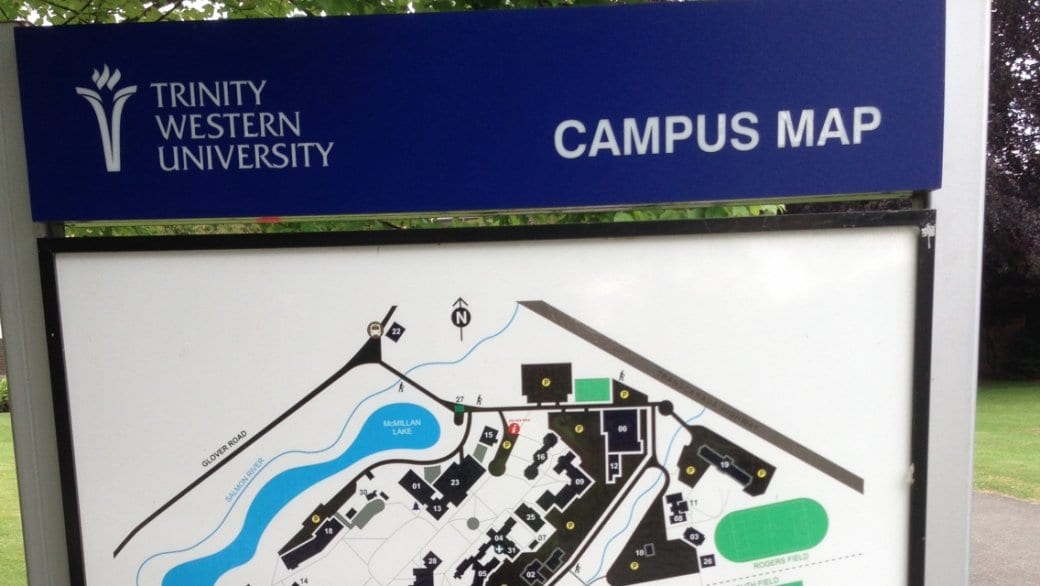Some queer Trinity Western University (TWU) alumni hope Universities Canada’s new commitment to non-discrimination will have consequences for their alma mater.
Universities Canada, an association representing 97 Canadian public and private not-for-profit universities, including TWU, has voted to adopt new non-discrimination requirements for membership.
“With respect to all institutional policies and practices, the institution affirms its commitment to equal treatment of all persons without discrimination, on the bases of . . . sex, and sexual orientation, or other grounds identified in applicable human rights law,” the association stated in a press release on Oct 26, 2016.
While Universities Canada does not accredit Canadian institutions, a responsibility that falls to provincial governments, it does connect universities with public and private investors, and promotes Canadian universities abroad.
TWU currently requires all students to sign a Community Covenant Agreement that states, in part, “In keeping with biblical and TWU ideals, community members voluntarily abstain from . . . sexual intimacy that violates the sacredness of marriage between a man and a woman.”
The covenant also says members of the TWU community must abstain from using or consuming pornography, alcohol and tobacco, and must “exercise careful judgment in all lifestyle choices, and take responsibility for personal choices and their impact on others.”
The covenant identifies “healthy sexuality” as an area “for careful discernment and sensitivity,” noting that “true freedom is not the freedom to do as one pleases, but rather empowerment to do what is best.”
“TWU reserves the right to question, challenge or discipline any member in response to actions that impact personal or social welfare,” the covenant adds.
Some queer TWU alumni argue the covenant violates students’ human rights.
Ren Lunicke, who uses the pronouns they/them, came out while attending TWU.
Lunicke crossed out the parts of the covenant they disagreed with. The first time they did this, they say it went unnoticed by the university. However, the second time Lunicke signed an amended version of the covenant, they were referred to a counsellor.
“Those who believed in everything the covenant outlined were quite vocal, and it meant that the people who were breaking the covenant had to keep quiet about it, which creates a shame culture in all kinds of ways,” Lunicke says. “For the most part, the culture did say, we expect this not to happen, and if it does happen, there’s something severely wrong with you and it’s a spiritual problem that you need to fix.”
Lunicke says their experience at TWU was “quite common.” Mars’ Hill, TWU’s student newspaper, recently published a two-part series on the experiences of queer TWU students.
In an email to Daily Xtra, TWU president Bob Kuhn says the university complies with Universities Canada’s new bylaw.
“Trinity Western University has always had a clear commitment to complying with all applicable human rights laws. Universities Canada’s new bylaw is informed by these laws, which make allowances for faith-based and other specialized institutions,” Kuhn says. “We will remain a valued member of Universities Canada as we have for more than 32 years.”
All prospective members of Universities Canada must comply with the new criterion to be eligible for membership. Existing members have until 2020 to make any necessary changes.
“This will give all institutions time to review their policies and processes,” says Philip Landon, VP of governance and partnerships for Universities Canada, in an email to Daily Xtra.
“With respect to any specific university policy, it will be the role of our Board of Directors to apply Universities Canada’s rigorous institutional review policy in any case raised and make a recommendation, if necessary, to the membership,” he says.
Landon says any recommendation to remove an institution’s membership requires approval from two-thirds of voting members.


 Why you can trust Xtra
Why you can trust Xtra


